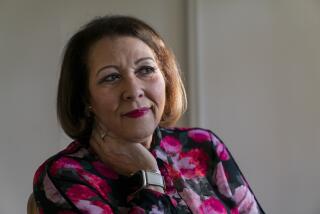Greater Clinical Trial Participation Is Crucial to Fight Cancer
- Share via
Nearly 1.3 million fathers, mothers, sisters and friends are diagnosed with cancer each year in the United States. In recognition of this staggering statistic, the federal government has committed unprecedented resources to finding a cure--more researchers, more dollars and more opportunities for a breakthrough.
Yet potential new therapies cannot be prescribed until researchers have conducted extensive clinical trials. This necessary step is being threatened because too few cancer patients--just 3%, according to the National Cancer Institute--are participating in trials for which they may be eligible. When research is halted, everyone suffers.
A recent UC Davis Cancer Center study found that such low rates of participation can often prolong the period of trials, delay analysis or even lead to the premature end of studies. UC Davis researchers found that the barriers that kept patients from participating in clinical trials include insufficient resources or coverage, health insurance restrictions, confusion about the difference between research and medical care, uncertainty about clinical trial procedures and misunderstanding about the severity of their own illness.
The recent approval of the drug Gleevec is an example of how vitally important clinical trials are to finding a cure. Developed by the Swiss pharmaceutical company Novartis, Gleevec was originally developed to treat chronic myelogenous leukemia. But the Boston-based Dana-Farber Cancer Institute believed it could be used to treat a gastrointestinal stromal tumor. Now, just two years after clinical trials began in July 2000, the federal Food and Drug Administration has approved Gleevec for use in treating these gastrointestinal tumors--a cancer that until recently had few treatments.
Gleevec, and other newly introduced cancer drugs, need not belong to some exclusive club. Indeed, it is critical that we take steps now to ensure that early clinical trials become a populist movement in the cancer world. Such a movement is within our grasp if we follow principles that have supported breakthrough scientific research in other areas of medicine.
We must better educate our physician and patient population through lay and professional literature, the mainstream and specialty media and the Internet.
We must push for the innovative harnessing of capital. New therapies can come to market only after lengthy and difficult testing programs, of which early clinical trials are a cornerstone. We must seek new ways to make private-public partnerships a reality, extending the reach of researchers to every cancer center in the country.
We must work with insurance companies, HMOs and other health-care providers to make certain that no patient is refused access to early clinical trials for fear that coverage will be withheld.
Effective clinical trials can find effective treatments for cancer, treatments that do not now exist and whose nonexistence costs hundreds of billions of dollars to insurance providers, the health-care establishment and the U.S. economy. Rep. Deborah Pryce (R-Ohio) has already begun work in this critical area by introducing a bill that would require insurance providers to continue covering patients who participate in approved trials.
Real hope is at hand. The vast majority of researchers, research institutions and sponsoring organizations recognize that a clinical trial is not simply an experiment and an opportunity to gather information but an attempt to save lives. Such institutions operate under the most ethical standards possible.
We are confident that, armed with valid and reliable information, many more cancer patients will choose to participate in clinical trials. Greater participation will mean better results. And better results will lead to more effective treatment, to better prevention strategies and, one day, to the elimination of cancer altogether.
*
Sherry Lansing, chairwoman of Paramount Studios, and Gen. Norman Schwarzkopf, commander of Operation Desert Storm, are board members of Friends of Cancer Research. Web site: www.focr.org.






